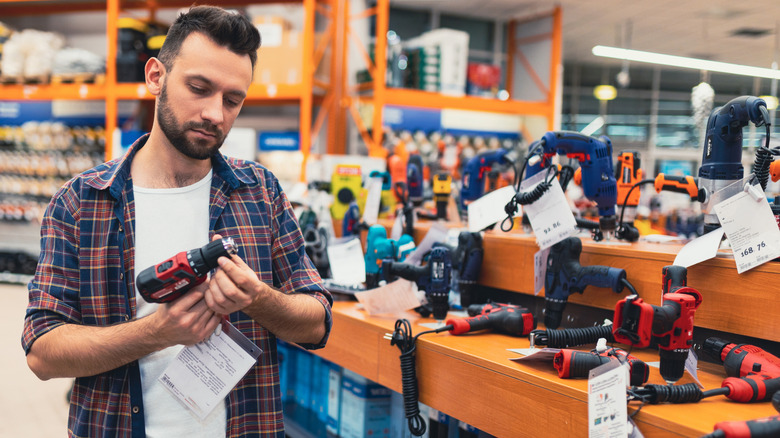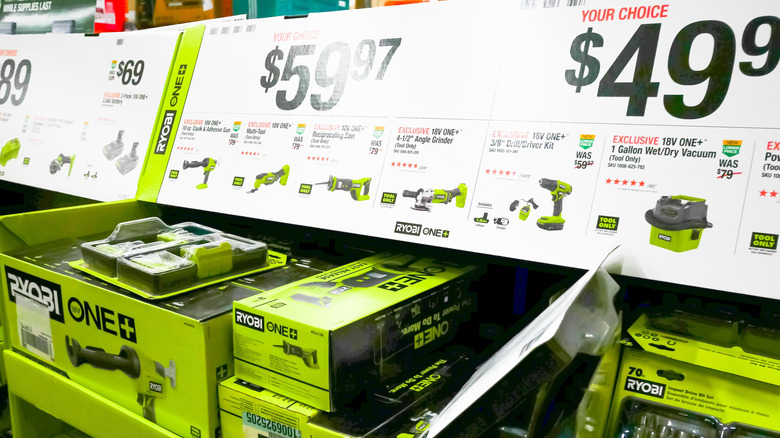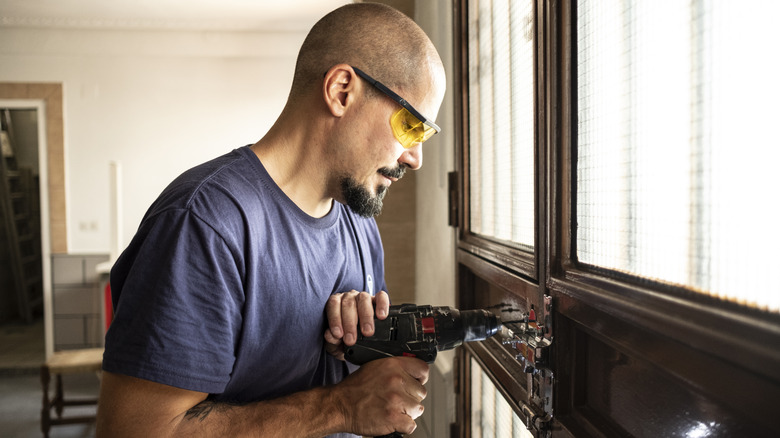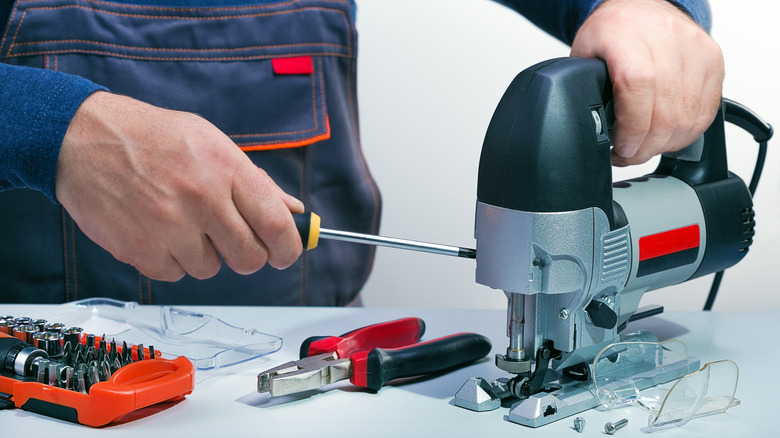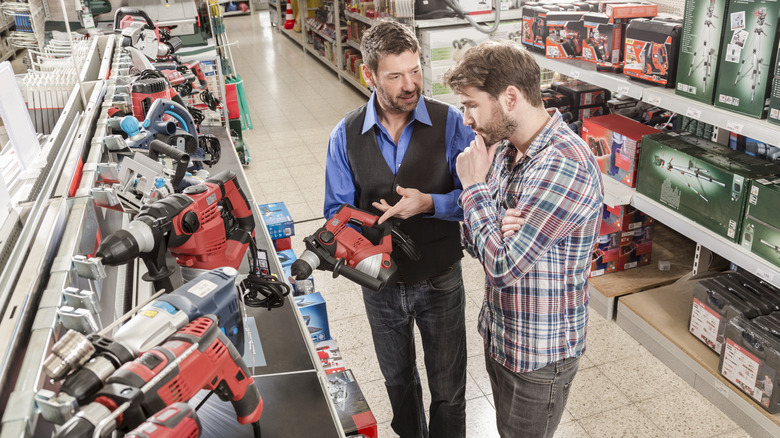Budget-Friendly Power Tools Have A Hidden Cost, And It's Not Just About Money
Cheap power tools are very tempting, especially DIY necessities like a cordless drill driver that costs under $30. The same tool from a big-name brand will likely cost you three or four times as much. Okay, there are cordless DeWalt tools for under $100, yes, but they're the exception. Ditto the other market leader, Milwaukee.
If you only need a power tool for one or two jobs, then I get why you would buy the cheapest available. In many cases, it could cost you less than a rental. However, if you expect to use a tool regularly for DIY projects or you're setting up a home workshop for hobbies or crafts, then most of these power tools are not just false economy — you're also buying a world of disappointment.
What do I know about it? Well, I've been a woodworker for over 30 years and ran my own pro shop for 11. I've renovated two homes pretty much from the ground up, tackling everything from framing and flooring to kitchen and bathroom installations. I also maintain my own vehicles. So, I reckon I've used just about every power tool on the market. I've had some fall apart on me, broken a few, and failed to break others despite treating them badly. I've bought cheap power tools in the past, but I wouldn't do so again, as they have a hidden cost: they're not reliable.
Positive reviews do not equal premium performance
You could argue that some cheap power tools must be okay because they get thousands of positive reviews at major online retailers. Well-known and trusted names like Black+Decker, Craftsman, and Ryobi are hugely popular, and they sell boatloads of drills, saws, and sanders to eager DIYers. All those glowing reports must mean there's not much wrong with them, right? Unfortunately, it may not be that simple.
My guess is that most of the positive reviews are written when those shiny new power tools have just been unwrapped and successfully completed their first task. If you take a look at the negative reviews, they generally reflect that something has gone wrong after a while. A common theme is that the tool worked initially, but after it had been put through its paces a number of times, it failed.
It's almost to be expected. If one power tool costs $50 and another costs $150, and they're both made in the same foreign factory by the same workforce (for example, Stanley owns both Craftsman and DeWalt), then the main difference must be component quality. That's bound to impact reliability and durability. It's not necessarily that the tools are inherently bad. If you want to buy a bunch of Ryobi tools for a kitchen renovation, they will probably be fine ... for that job, at least. However, expecting them to continue to consistently perform at that level is optimistic at best.
Goodbye accuracy, hello frustration
The problems with cheap, poorly-made power tools — or those that wear too quickly — go beyond a lack of reliability. Tools that vibrate excessively make it difficult, if not impossible, to work with any accuracy. Beyond that, they are also uncomfortable and tiring to use. And as bearings wear, blades wander. If tools break while you're working, there are potential injury hazards. All of these things take something that should be a pleasure and satisfying on a personal level and turn it into a frustrating and annoying experience.
I'm not the only one who feels this way. In an article on power tool brands to avoid at all costs, founder of JJP Construction Jason Pietruszka points out that, while you might get lucky when buying cheap power tools, most don't hold up over time. The same is true of the accessories that are often included and seem to add tremendous value. In practice, drill bits and saw blades go blunt quickly, while sockets and screwdriver bits distort or break when any pressure is applied.
Benefits to buying high-quality tools
Besides being more reliable, easy to use, and safer, there are many other advantages to buying high-quality power tools. To start, it's relatively easy to find a wide range of those all-important power tool accessories every homeowner should have. They're usually available both from the manufacturer and third-party suppliers who may offer more competitive pricing. Also, on the rare occasions something does go wrong, it's usually possible to get spares or have them repaired.
Furthermore, high-quality tools are better for the environment. Some people will argue that if their cheap power tool breaks, they can simply throw it away and buy another. They can buy two or three for the price of one good tool. But what happens to the old tool? It goes in the trash. So do the battery and charger, because you're unlikely to buy from the brand that let you down, and you can bet they won't be compatible with your new tool. On the other hand, if you buy a reliable drill, there's a good chance you'll buy a saw, sander, or whatever from the same brand. The same batteries fit all of them. That's not just more economical, they also last longer, so fewer harmful chemicals and less waste go into landfills.
Let's not confuse price with value
There's a common misconception that cheap power tools are fine for beginners. But how are you supposed to improve your skill if you're trying to work with inferior equipment? If you buy a quality power tool, you can focus on the task at hand rather than trying to compensate for poor performance. You'll do a better job, and things that were formally consigned to a list of chores will become enjoyable challenges.
Few of us have the budget to splurge on a large collection of DeWalt tools or things like Milwaukee's 9-tool combo kit for home projects, but you can check for sales, keep an eye out for bargains, and build a collection of high-quality power tools over time. There are also several quality alternatives. I'm a big fan of Bosch power tools, and Makita has a great reputation. Metabo HPT and Ridgid are other popular mid-range choices.
Yes, these tools will initially cost more than buying those cheap power tools that seem to be a bargain, but let me give you a personal example of economy over time. About 30 years ago, when I started out woodworking, I bought a Bosch jigsaw and an electric planer. I still have them, and the only things I've had to replace are the blades. I don't recall what I paid, but they were expensive. If they were, let's say, $100 each back then, that works out at well under $4 a year for each tool. Show me a cheap power tool that's a better value than that.
